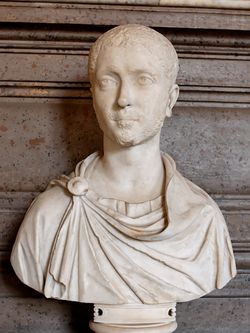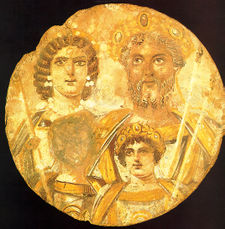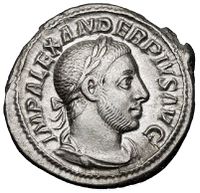Alexander Severus
| Alexander Severus | |
|---|---|
| Emperor of the Roman Empire | |
 |
|
| Bust of Alexander Severus | |
| Reign | 222 – 18 / 19 March 235 |
| Full name | Marcus Julius Gessius Bassianus Alexianus (from birth to adoption); Caesar Marcus Aurelius Alexander (from adoption to accession); Caesar Marcus Aurelius Severus Alexander Augustus (as emperor) |
| Born | October 1, 208 |
| Birthplace | Arca Caesarea, Syria Phoenicia Province (modern Akkar, Lebanon) |
| Died | March 18 or 19 235 (aged 26) |
| Place of death | Moguntiacum, Germania Superior |
| Predecessor | Elagabalus |
| Successor | Maximinus Thrax |
| Consort to | Sallustia Orbiana |
| Royal House | Severan |
| Father | Marcus Julius Gessius Marcianus |
| Mother | Julia Mamaea |
| Roman imperial dynasties | |||
| Severan dynasty | |||
 The Severan Tondo |
|||
| Chronology | |||
| Septimius Severus | 193 – 198 | ||
| -with Caracalla | 198 – 209 | ||
| -with Caracalla and Geta | 209 – 211 | ||
| Caracalla and Geta | 211 – 211 | ||
| Caracalla | 211 – 217 | ||
| Interlude: Macrinus | 217 – 218 | ||
| Elagabalus | 218 – 222 | ||
| Alexander Severus | 222 – 235 | ||
| Dynasty | |||
| Severan dynasty family tree Category:Severan Dynasty |
|||
| Succession | |||
| Preceded by Year of the Five Emperors |
Followed by Crisis of the Third Century |
||
Marcus Aurelius Severus Alexander (1 October 208 – 18 March 235), commonly known as Alexander Severus, was Roman Emperor from 222 to 235. He was the last emperor of the Severan dynasty. Alexander Severus succeeded his cousin, Elagabalus upon the latter's assassination in 222, and was ultimately assassinated himself, marking the epoch event for the Crisis of the Third Century - nearly fifty years of civil wars, foreign invasion, and collapse of the monetary economy.
Alexander Severus was the heir apparent to his cousin, the eighteen-year-old Emperor who had been murdered along with his mother by his own guards—and as a mark of contempt, had their remains cast into the Tiber river. He and his cousin were both grandsons of the influential and powerful Julia Maesa, who had arranged for Elagabalus' acclamation as Emperor by the famed Third Gallic Legion.
A rumor of Alexander's death circulated, triggering the assassination of Elagabalus.
As Emperor, Alexander's peace time reign was prosperous. In military conflict against the rising Sassanid Empire, there are mixed accounts, though the Sassanid threat was checked. However, when campaigning against Germanic tribes of Germania, Alexander Severus apparently alienated his legions by trying diplomacy and bribery, and they assassinated him.
Contents |
Life
Alexander was born with the name Marcus Julius Gessius Bassianus Alexianus. Alexander's father, Marcus Julius Gessius Marcianus was a Syrian Promagistrate. His mother Julia Avita Mamaea was the second daughter of Julia Maesa and Syrian noble Julius Avitus and maternal aunt of Emperor Elagabalus. He had an elder sister called Theoclia and little is known about her. Alexander's maternal great-aunt was empress Julia Domna (also Maesa's younger sister) and his great-uncle in marriage was emperor Lucius Septimius Severus. Emperors Caracalla and Publius Septimius Geta, were his mother's maternal cousins. In 221, Alexander's grandmother, Maesa, persuaded the emperor to adopt his cousin as successor and make him Caesar and Bassianus changed his name to Alexander. In the following year, on March 11, Elagabalus was murdered, and Alexander was proclaimed emperor by the Praetorians and accepted by the Senate.
When Alexander became emperor, he was young, amiable, well-meaning, and entirely under the dominion of his mother. Julia Mamaea was a woman of many virtues, and she surrounded the young emperor with wise counsellors. She watched over the development of her son's character and improved the tone of the administration. On the other hand, she was inordinately jealous. She also alienated the army by extreme parsimony, and neither she nor her son were strong enough to impose military discipline. Mutinies became frequent in all parts of the empire; to one of them the life of the jurist and praetorian praefect Ulpian was sacrificed; another compelled the retirement of Cassius Dio from his command.
On the whole, however, the reign of Alexander was prosperous until the rise, in the east, of the Sassanids. Of the war that followed there are various accounts. (Mommsen leans to that which is least favourable to the Romans). According to Alexander's own dispatch to the senate, he gained great victories. At all events, though the Sassanids were checked for the time, the conduct of the Roman army showed an extraordinary lack of discipline. The emperor returned to Rome and celebrated a triumph in 233.
The following year he was called to face German invaders in Gaul, who had breached the Rhine frontier in several places, destroying forts and over-running the countryside. Alexander mustered his forces, bringing legions from the eastern provinces, and crossed the Rhine into Germany on a pontoon bridge. Initially he attempted to buy the German tribes off, so as to gain time. Whether this was a wise policy or not, it caused the Roman legionaries to look down on their emperor as one who was prepared to commit unsoldierly conduct. Herodian says "in their opinion Alexander showed no honourable intention to pursue the war and preferred a life of ease, when he should have marched out to punish the Germans for their previous insolence". These circumstances drove the army to look for a new leader. They chose Gaius Iulius Verus Maximinus, a Thracian soldier who had worked his way up through the ranks.
Following the nomination of Maximinus as emperor, Alexander was slain (on either March 18 or March 19, 235), together with his mother, in a mutiny of the Legio XXII Primigenia. These assassinations secured the throne for Maximinus.
The death of Alexander is considered as the end of the Principate system established by Augustus. Although the Principate continued in theory until the reign of Diocletian, Alexander Severus' death signalled the beginning of the chaotic period known as the Crisis of the Third Century which weakened the empire considerably.
Legacy

Alexander was the last of the Syrian emperors. Under the influence of his mother, he did much to improve the morals and condition of the people. His advisers were men like the famous jurist Ulpian, the historian Cassius Dio and a select board of sixteen senators; a municipal council of fourteen assisted the urban praefect in administering the affairs of the fourteen districts of Rome. The luxury and extravagance that had formerly been so prevalent at the court were put down; the standard of the coinage was raised; taxes were lightened; literature, art and science were encouraged; the lot of the soldiers was improved; and, for the convenience of the people, loan offices were instituted for lending money at a moderate rate of interest.
In religious matters Alexander preserved an open mind. It is said that he was desirous of erecting a temple to the founder of Christianity, but was dissuaded by the pagan priests.
Marriage
Alexander was married three times. His most famous wife was Sallustia Orbiana, Augusta, whom he married in 225. He divorced and exiled her in 227, after her father, Seius Sallustius, was executed for attempting to assassinate the emperor. Another wife was Sulpicia Memmia. Her father was a man of consular rank; her grandfather's name was Catulus.[1]
See also
- Severan dynasty family tree
- Portland Vase
External links
 Media related to Alexander Severus at Wikimedia Commons
Media related to Alexander Severus at Wikimedia Commons "Alexander Severus". Catholic Encyclopedia. New York: Robert Appleton Company. 1913.
"Alexander Severus". Catholic Encyclopedia. New York: Robert Appleton Company. 1913.- Life of Alexander Severus (Historia Augusta at LacusCurtius: Latin text and English translation)
- Severus Alexander a site devoted to this emperor
- Severus Alexander on NumisWiki
- Coins of Severus Alexander
References
- ↑ Aelius Lampridius, Alexander Severus, c. 20.
 This article incorporates text from a publication now in the public domain: Chisholm, Hugh, ed (1911). Encyclopædia Britannica (Eleventh ed.). Cambridge University Press.
This article incorporates text from a publication now in the public domain: Chisholm, Hugh, ed (1911). Encyclopædia Britannica (Eleventh ed.). Cambridge University Press.- Lampridius, Alexander Severus
- Dio Cassius lxxviii.30, lxxix.17, lxxx.1
- Herodian vi.1–18
- Porrath, Der Kaiser Alex. Sev. (1876)
- Pauly–Wissowa, Realencyclopadie, ii.2526 foll. (Groebe)
- RV Nind Hopkins, Cambridge Historical Essays, No. xiv. (1907)
|
Alexander Severus
Severan dynasty
Born: 1 October 208 Died: 18/19 March 235 |
||
| Regnal titles | ||
|---|---|---|
| Preceded by Elagabalus |
Roman Emperor 222–235 |
Succeeded by Maximinus I (Thrax) |
| Political offices | ||
| Preceded by Gaius Vettius Gratus Sabinianus, Marcus Flavius Vitellius Seleucus |
Consul of the Roman Empire 222 with Elagabalus |
Succeeded by Marius Maximus , Luscius Roscius Aelianus Paculus Salvius Julianus |
| Preceded by Tiberius Manilius Fuscus, Servius Calpurnius Domitius Dexter |
Consul of the Roman Empire 226 with Gaius Aufidius Marcellus |
Succeeded by Marcus Nummius Senecio Albinus , Marcus Laelius Fulvius Maximus Aemilianus |
| Preceded by Quintus Aiacius Modestus Crescentianus, Marcus Pomponius Maecius Probus |
Consul of the Roman Empire 229 with Cassius Dio |
Succeeded by Lucius Virius Agricola , Sextus Catius Clementinus Priscillianus |
|
|||||||||||||||||||||||